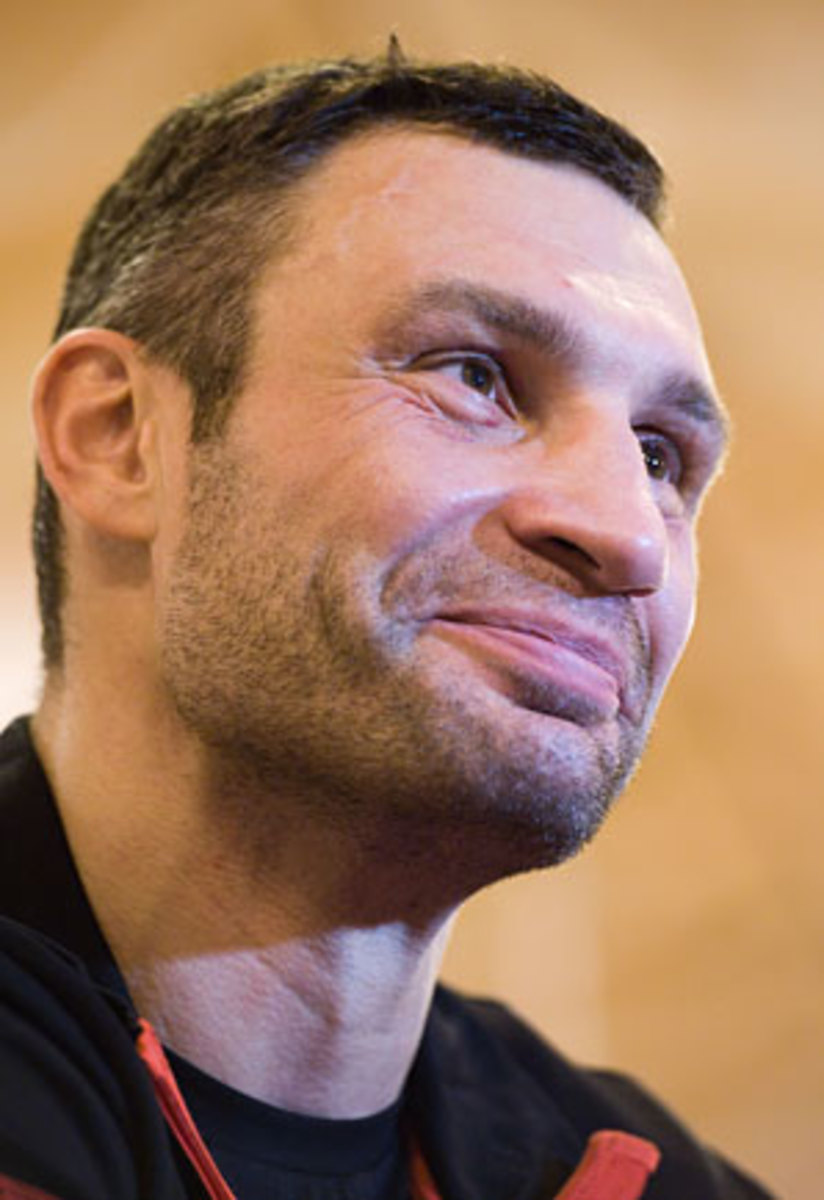Klitschko is a 40-year-old man succeeding in a young man's sport
MUNICH -- The steam poured off Vitali Klitschko's oatmeal, vanishing only after being buried under a pile of fresh fruit and cooled with a splash of skim milk. Eat right, drink right, train right; these are the rules Klitschko has lived by, from his early days as an amateur kickboxer to his current reign as the WBC heavyweight champion. The silver hairs outnumber the dark ones on his head now, but there still isn't an ounce of fat on his 6-foot-7, 243-pound frame.
Another day, another fight, another opponent, and the 40-year old Klitschko could not possibly enjoy it more. Dereck Chisora (15-2, 10 KOs) will be the latest to try to strong arm the title away from Klitschko (43-2, 40 KOs), on Saturday (4:30 p.m. ET, Epix/EpixHD.com), and Klitschko is begging him to try. "I don't think anyone can beat me," he said between mouthfuls in his hotel suite, and his flawless 8-0 record since coming out of retirement in 2008 is evidence of that.
An oft-asked question in interviews is when will Klitschko retire, but the better one is, why would he? Klitschko is guaranteed $3 million to fight Chisora and will walk away with probably twice that when all the revenue is counted. The body that forced him out of the sport in 2004 is healthy, the motivation to fight still strong. Against the wishes of his wife, his mother and his brother, he came back to boxing because contenders like Hasim Rahman, Samuel Peter and Oleg Maskaev looked beatable, because their fights were "painful to watch." Time has passed, little has changed. He says he has no interest in being George Foreman, but really, why stop?
"Boxing is in my heart," Klitschko said. "It will be in my heart all of my life."
He is arguably the greatest heavyweight of this century -- younger brother Wladimir offers the only competition -- with a legacy that is secure. Still, he flinches when a reporter brings up the criticism of his era, the never-ending questions about how Klitschko would have fared in a different era. He flinches because, well, he wonders too. He admits he watches old film of Ali, dissecting it for weaknesses, devising a strategy on how to beat him. He laments Mike Tyson's loss to Danny Williams in 2004 because had Tyson won, a showdown with Klitschko would have been next.
He continues to press forward, continues to seek challenges. He pounced on Chisora quickly after Chisora's loss to Robert Helenius in December, in part because Chisora had been lined up to face Wladimir, in part because most thought Chisora won against Helenius. He talks about the future, about luring David Haye into the ring ("I want to knock him out," Klitschko said), about coaxing Russian giant Nikolai Valuev out of retirement, about a rematch with Chris Arreola on U.S. soil. He talks like a fighter gearing up, not one ready to start winding down.
"[I] don't give anyone a chance inside the ring," Klitschko said. "[I] leave no room for doubt that [I am] stronger than [my] opponents."
He says he still has a dream, and no, it's not to fight his brother. "Other than a hairy chest," Klitschko said, "he's much better than me." He refuses to discuss the dream, other than to say he has no intention of quitting until he reaches it.
"This dream keeps me active in boxing," Klitschko said. "It motivates me to keep going into the ring."
If there is something that will pull Klitschko out of the ring, it's politics, the other passion in his life. Klitschko voted for Ukrainian independence 20 years ago and is anxious to be a part of charting his country's course over the next 20. He has twice lost the mayoral race in Kiev, but that has done little to slow his momentum. His opposition party, The Punch, has started to collect representatives in local legislatures. He has a platform, one that favors European integration and making Ukrainian the one and only national language.
"I have spent a lot of time in Germany, in western Europe, in the U.S.," Klitschko said. "I want the western life standards for my country. Ukraine is a young democracy with huge potential, but it doesn't have those standards. I don't want to wait for changes in my country. I know what has to change."
As he speaks, his words are measured, the gravely seriousness evident in his voice. Indeed, there will come a time when Klitschko returns to his country, to take on the biggest challenge of all. For now he is content to enjoy his future in boxing, an old man in a young man's sport, virtually unbeatable and loving every step along the way.






